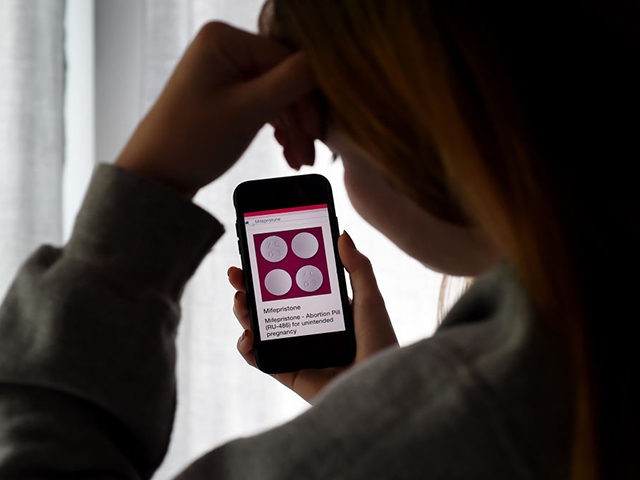Tens of thousands of women in states that have abortion restrictions were able to obtain abortion pills via telehealth from abortionists in Democrat-run states that shield the providers from prosecution, a new study found.
Data released by the pro-abortion Society of Family Planning’s WeCount project reveals that between July and December of 2023, more than 40,000 people in states with abortion and telehealth restrictions obtained abortion pills through providers in states with shield laws. In the wake of the Supreme Court’s Dobbs decision, which overturned the “constitutional right” to abortion invented under Roe v. Wade, at least seven states have passed “shield laws” designed to legally guard abortionists who send abortion pills to women in states with laws limiting abortion.
The WeCount study found that from October to December of 2023, nearly 8,000 women per month in states with abortion restrictions obtained abortion pills through telehealth from abortionists located in five states that had passed shield laws at the time. Since the data was collected, Maine and California have also passed shield laws, bringing the total to seven.

Professor Emile-Etienne Beaulieu, inventor of the RU-486 abortion-inducing drug, holds the pills in Paris on January 11, 1995. (Remy de la Mauviniere, file/AP)
The WeCount project only counted abortions within the U.S. healthcare system and did not include self-managed abortions, which often occur without clinician oversight or from ordering pills online and through underground networks.
“For that reason, researchers believe these numbers are still an undercount of abortions happening in the U.S.,” NPR reported of the study.
The WeCount project found an increase in the number of all abortions in the 18 months following the Supreme Court’s Dobbs decision, which sent the issue of abortion back to individual states. According to the report, an average of 86,000 abortions occurred per month, compared to about 82,000 abortions per month in 2022.
But the pro-abortion organization noted that despite the increase, more than a dozen states have barred health care workers from performing abortions — which they say resulted in nearly 180,000 fewer in-person abortions in states that either outlawed abortion or passed a six-week restriction.
The report partly attributed the overall increase in abortions to telehealth , which is enabled by President Joe Biden’s Food and Drug Administration (FDA). In December of 2021, the FDA issued pandemic-era guidance lifting the requirement for women to obtain abortion pills in person from a health provider. The FDA officially removed the in-person requirement from its regulatory rule book for mifepristone in January of 2023. At the same time, Biden’s Department of Justice (DOJ) cleared the U.S. Postal Service to deliver abortion drugs to states with abortion restrictions and bans, offering “limited assurances that a federal law addressing the issue won’t be used to prosecute people criminally over such mailings,” Politico reported at the time.
The WeCount report found that telehealth abortions made up 19 percent of all abortions in the United States in the last few months of 2023.
“In comparison, the first WeCount report which spanned April 2022 through August 2022 showed telehealth abortions accounted for just 4% of all abortions,” NPR reported.
Tessa Longbons Cox, a senior research associate at the pro-life research organization Charlotte Lozier Institute, told the left-leaning outlet that the WeCount report “highlights a concerning trend” that policies enabling telehealth abortions are boosting abortion numbers.
“By recklessly removing in-person medical visits and safeguards, abortion advocates have put women’s health and safety last,” Longbons Cox said.
The Supreme Court is currently weighing a case brought by pro-life organizations and doctors who want the FDA to reinstate several safety regulations around the use of mifepristone, including the previous in-person requirement.
Katherine Hamilton is a political reporter for Breitbart News. You can follow her on X @thekat_hamilton.

COMMENTS
Please let us know if you're having issues with commenting.